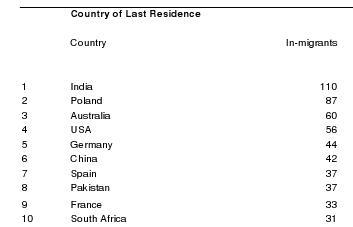Do most immigrants come from Asia and Africa?
"...we need a rigorous crackdown on immigration, running at the absurd level of 600,000 arrivals a year, the majority from Asia or Africa."
The Express, 12 August 2011
The fallout from last week's riots has proved the stimulus for an intense scrutiny of the relationships that underpin notions of society and community.
Join 72,953 people who trust us to check the facts
Sign up to get weekly updates on politics, immigration, health and more.
Subscribe to weekly email newsletters from Full Fact for updates on politics, immigration, health and more. Our fact checks are free to read but not to produce, so you will also get occasional emails about fundraising and other ways you can help. You can unsubscribe at any time. For more information about how we use your data see our Privacy Policy.
On Friday the Express's Leo McKinstry made the link between immigration and community, claiming that an influx of migrants had undermined the notion that "the only community in this country should be a British one."
Full Fact has looked at the issue of immigration statistics and the way in which they are reported a number of times and we have frequently discovered problems and inconsistencies.
So does the claim that the majority of the 600,000 immigrants that arrived on these shores last year came from Asia and Africa hold water?
Analysis
Data on the number and backgrounds of immigrants entering the UK is compiled by the Office for National Statistics in its International Passenger Survey (IPS).
Commonly, the country of origin is broken down into the categories of EU, non-EU and Commonwealth residents. However in order to judge whether or not the majority of immigrants come from Asia and Africa, we need to look beyond these headline categories.
We therefore got in touch with The Migration Observatory of Oxford University, which publishes detailed research on migration and the various characteristics of immigrants within the UK.
Looking at the most common origins of immigrants to the UK, we can see that four of the top ten countries are in Asia or Africa. As shown below, India tops this particular table with 110,000 people moving to the UK in 2009.

(As the Migration Observatory explained to us, the ONS only publishes data on the countries sending the largest number of immigrants, as the margin of error for smaller samples would have been so big as to make the data worthless, given the nature of the survey.)
Taking the migrant flow from these four Asian and African countries, we can see that together they account for just over a third (34 per cent) of inward migration, some way short of the 'majority' claimed in the Express.

However this does not necessarily mean that the Express is entirely wrong in its analysis. The figures above count the total number of people arriving in the UK, including British nationals returning to the country having previously been resident abroad.
If we exclude this group and focus instead on foreign nationals, then a different picture emerges. As the table below shows, 52 per cent — a slim majority — of these immigrants are from Africa or Asia (based upon their last country of residence).

However there is a problem with this analysis.
The Express claims that of the "600,000 arrivals, the majority [are] from Africa or Asia."
But to get close to the 600,000 figure it quotes, you need to look at total inflow, including British nationals.
The ONS records that a total of 567,000 people migrated to the UK in 2009 (which can be generously rounded to 600,000 arrivals). However only 471,000 of these were non-British citizens.
Conclusion
On the basis of the information published in the International Passenger Survey, the Express's claim is therefore slightly misleading.
While the 600,000 figure and the notion that the "majority" of immigrants came from Africa and Asia can both be substantiated individually, it is not accurate to say that a majority of the 600,000 came from these continents.